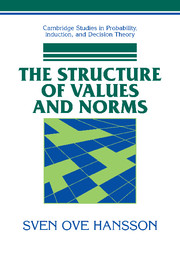Book contents
- Frontmatter
- Contents
- Preface
- PROLEGOMENA
- PART I VALUES
- 2 Exclusionary Preferences
- 3 Preference States
- 4 Changes in Exclusionary Preferences
- 5 Constructing Combinative Preferences
- 6 Pairwise Combinative Preferences
- 7 Decision-Guiding Combinative Preferences
- 8 Monadic Value Predicates
- PART II NORMS
- EPILOGUE
- Proofs
- References
- Index of Symbols
- General Index
6 - Pairwise Combinative Preferences
Published online by Cambridge University Press: 13 August 2009
- Frontmatter
- Contents
- Preface
- PROLEGOMENA
- PART I VALUES
- 2 Exclusionary Preferences
- 3 Preference States
- 4 Changes in Exclusionary Preferences
- 5 Constructing Combinative Preferences
- 6 Pairwise Combinative Preferences
- 7 Decision-Guiding Combinative Preferences
- 8 Monadic Value Predicates
- PART II NORMS
- EPILOGUE
- Proofs
- References
- Index of Symbols
- General Index
Summary
When discussing with my wife what table to buy for our living room, I said: “A round table is better than a square one.” By this I did not mean that irrespective of their other properties any round table is better than any square-shaped table. Rather, I meant that any round table is better (for our living room) than any square table that does not differ significantly in its other characteristics, such as height, sort of wood, finishing, price, etc. This is preference ceteris paribus, or “everything else being equal.”
As was indicated in Section 5.3, ceteris paribus preferences are a paradigm type of pairwise preferences. It is the purpose of this chapter to investigate how combinative pairwise preferences can be derived from exclusionary preferences. Examples and intuitive arguments will appeal to the ceteris paribus interpretation, but the formal framework is more general and does not exclude other interpretations.
Section 6.1 is devoted to a fairly detailed investigation of the feature that characterizes combinative in contradistinction to exclusionary preferences, namely that compatible relata can be compared. In Sections 6.2 and 6.3, a general format for deriving combinative preferences is introduced. In Section 6.4, three more specified variants of this format are introduced, and in Sections 6.5 and 6.6 their logical properties are studied.
HOW TO COMPARE COMPATIBLE ALTERNATIVES
It is obvious from ordinary usage that ceteris paribus preferences are combinative, in other words, they allow for compatible relata.
- Type
- Chapter
- Information
- The Structure of Values and Norms , pp. 67 - 93Publisher: Cambridge University PressPrint publication year: 2001



